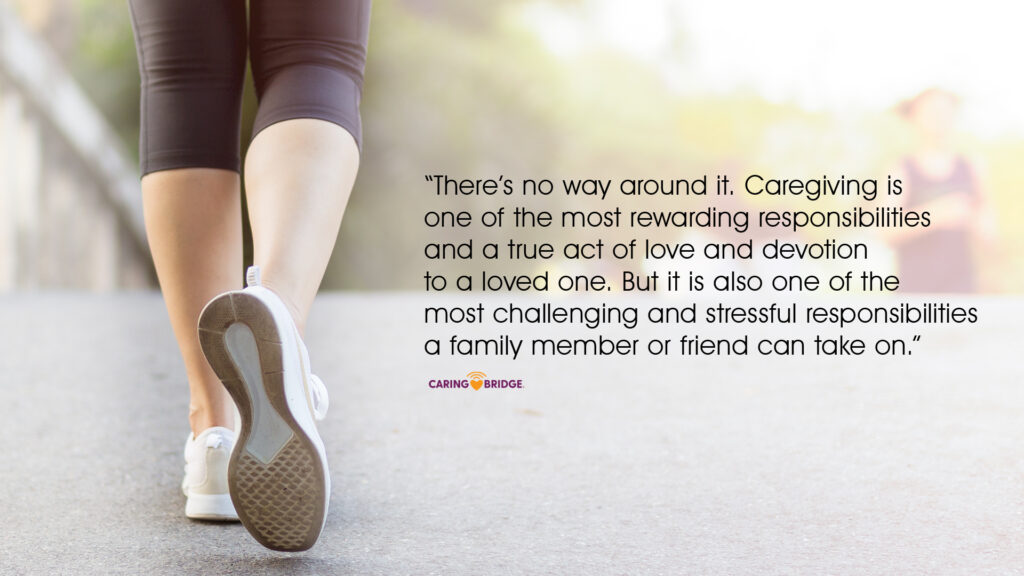Caring Bridge offers tips for reducing the strain of care giving:

There’s no way around it. Caregiving is one of the most rewarding responsibilities and a true act of love and devotion to a loved one. But it is also one of the most challenging and stressful responsibilities a family member or friend can take on.
1. Stay Organized
Between appointments, trips to the store, making dinner, going into work – life can get away from you pretty fast.
Start each day with a to-do list, or block out time in your calendar to get the top priorities done. That way you will feel like you have some direction and control. Be flexible, and don’t sweat if you have to adjust each day.
Keeping a calendar, budget, grocery list, and book of different passcodes (there are so many “patient portals” to log in to these days!) will help you regain a little sanity in your everyday life.
2. Focus on What You Are Able to Provide
You don’t have all the answers, and sometimes there are limits to what you can do to help. Set realistic goals for yourself. This is not to say don’t be optimistic or hopeful! But find the things you know you can provide.
For instance, you may be able to offer a warm meal each night, an afternoon walk or helping them get dressed in the morning. On the other hand, ask for help for the things you know you can’t provide, such as injections, physical therapy, or lifting them into bed.
3. Build a Caregiver Support Team
They say it takes a village to raise a child, and caregiving is no different. It’s easy to feel like everything is up to you when it’s just you and your loved one in the home. But you are not alone.
Form a care team! Find ways to loop in other family or friends. It will take some of the strain and responsibility off you, and it can help them know they still have a place in their loved one’s life.
Tip: Our free CaringBridge online health journal allows you to update everyone at once, so all your loved ones are on the same page. Our on-site Planner helps you coordinate tasks like bringing meals, rides to doctor appointments, or taking care of pets, which can help take some of the strain off of you.
4. Seek Respite Care
Consider adding to your support team to get you and your loved one the help you need. If you’re financially able, there are a few respite care options available.
A home healthcare aide comes in to provide medical assistance, companionship, or both. There are different adult care centers or programs for care during the day. Some nursing or care facilities offer short term stays so that you can take the vacation you need, knowing your loved one is in good hands.
5. Apply For a Leave From Your Out-of-Home Job
Caregiver role strain can be much more intense when you are balancing caregiving with childcare, and a full-time job. If you are an employee covered under the federal Family and Medical Leave Act, you might be able to take up to 12 weeks of unpaid leave a year to care for your relative. Contact your human resource office for options.
6. Find Caregiving Teachers and Support Groups
Caregiving is an old practice, dating back to the beginning of human history. There are many great caregivers that have gone before you and will come after you.
There are a number of resources available to make you feel more connected and involved in the caregiving community. Consider joining a support group or reading a great book about caregiving to help you feel less alone, and learn how to take care of yourself and your loved one the best way you can.
7. Reach Out to Your Spiritual or Faith Community
Having a strong spiritual life, or believe in a higher power, or God is often a balm. Many caregivers find it helpful to set aside time to pray or meditate, engage with their faith community by attending worship services, or draw strength from a high power.
8. Take Care of Your Own Health
When someone else’s health is in more immediate need than your own, it’s easy to prioritize theirs over yours. But your physical and mental health is more important than ever when someone else is counting on you.
Take time every day, even if it’s only 15 minutes, to go on a walk or exercise. Make sure you are able to get 7-9 hours of sleep each night and are fueling your body with good foods. You may be going to the doctor frequently for your care recipient, but don’t forget to make time for your own appointments.
9.Make Time For Yourself
It may start to feel like you are living for someone else. It’s important for your mental well-being to recognize your identity outside of caregiving.
Find a way to make time for your own hobbies, like reading, knitting, painting, practicing an instrument, going to concerts, going wine tasting, or listening to music.
10. Get Out of The House
Lastly, take the time to get out of the house. Head outside and smell the fresh air. Have phone calls with friends and family. If you can, get out once a week for a meal or happy hour, or join a virtual meetup with friends. Stay connected to the people in your life that offer non-judgmental emotional support.
READ MORE AT https://www.caringbridge.org/resources/caregiver-role-strain
